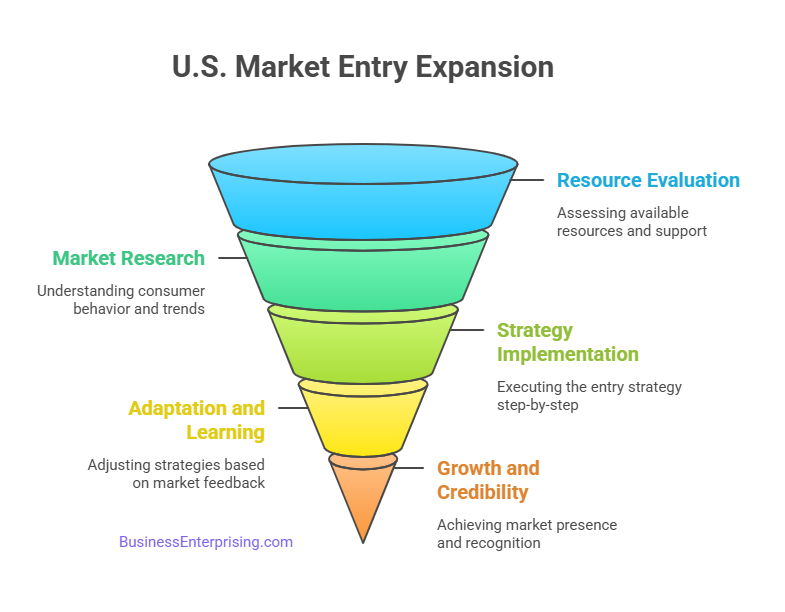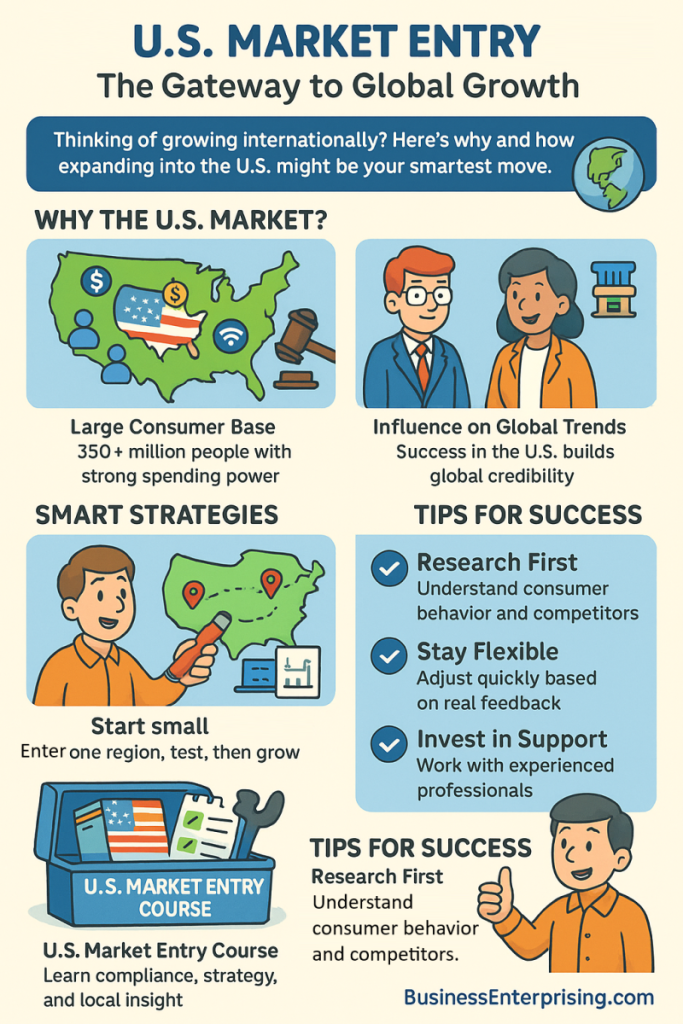U.S. market entry expansion offers a powerful path to growth, but it takes planning, patience, and the right support to succeed. With thoughtful preparation, you can enter one of the most competitive and profitable markets in the world. However, it’s important to approach the process with realistic expectations and a clear strategy.
Additionally, the U.S. offers strong consumer demand and advanced infrastructure to help your business scale. You don’t need to expand everywhere at once. Instead, start with a focused approach and adjust based on real market feedback. Many companies begin small, refine their process, and grow from there.
Therefore, it’s important to evaluate your resources and identify where support is needed. Consultants, advisors, and training tools can help you avoid common mistakes. Although challenges will arise, setting practical goals and timelines keeps your team on track. You’ll gain clarity as you spend more time in the market.
Moreover, entering the U.S. can build global credibility. Success here often leads to recognition in other regions. This exposure can support future expansion. However, your team must stay flexible and ready to pivot when needed.
If you stay focused and adapt quickly, your business can grow steadily over time. The U.S. market rewards companies that deliver value and consistency. Therefore, build strong systems early and scale only when you’re ready. You don’t need perfection to begin. What matters is taking that first step with confidence and preparation.
The Appeal of the U.S. Market
The U.S. market remains a powerful magnet for international companies seeking growth. With over 330 million consumers, it offers strong demand. Many companies see this as an opportunity to scale their operations and increase revenue. You may find the size and diversity of the market highly attractive. Every major sector has competition, but also room for new ideas and better execution.
Additionally, the U.S. offers a stable business environment. Legal protections and property rights give companies confidence to invest. While you may face regulatory steps, the system supports fair business practices. Therefore, international brands often find long-term opportunities in this market. Consumers tend to reward innovation, good service, and strong branding.
The appeal goes beyond consumer demand. The U.S. has a strong digital infrastructure, making it easier to reach customers. You can use digital channels to test products and gain feedback quickly. This flexibility gives your business a chance to adjust before scaling. Moreover, you will have access to one of the world’s most advanced supply chains.
However, success takes planning. You need a clear strategy to stand out from the competition. That’s where U.S. market entry expansion planning becomes essential. It helps you adapt to local tastes and legal requirements. With the right support, you can avoid common mistakes and make progress faster.
Ultimately, your business can benefit from a well-timed entry into the U.S. market. If you stay focused and informed, you can reach your goals. Although competition is high, the rewards often make it worth the effort.
Key Benefits of Expanding into the U.S.
Expanding into the U.S. offers clear advantages for growing your business. The market size alone creates a wide base of potential customers. Additionally, many buyers in the U.S. have strong spending power and seek value and innovation. You can often find opportunities that are less accessible in smaller or more saturated regions.
Moreover, the U.S. supports a healthy environment for business development. With access to capital and reliable legal systems, you can scale more confidently. Therefore, companies often find it easier to secure partnerships or funding. You may also benefit from access to skilled talent and advanced technology.
Another major benefit is market influence. U.S. trends tend to shape demand in other regions. If your product succeeds here, it may open new international doors. Additionally, the country has well-developed logistics and infrastructure. You can move goods efficiently and serve customers across large regions.
However, success still requires preparation. That’s why U.S. market entry expansion planning is so important. You must understand consumer expectations, pricing, and regulatory needs. With the right plan, you can adjust faster and reduce risk.
You don’t need to rush into every state at once. Many businesses begin in one region and grow from there. By starting small and building steadily, you give your brand time to connect. If you remain flexible and informed, expansion becomes more manageable and rewarding.
U.S. market entry expansion comes with several significant advantages. These benefits can help international companies establish a strong presence and achieve sustained growth.
Access to Capital
Firstly, the U.S. is home to a well-developed financial system and a vibrant investment landscape. Foreign companies can access various funding sources, including venture capital, private equity, and public markets. This access to capital can fuel expansion efforts, support research and development, and enable businesses to scale rapidly.
Advanced Infrastructure
Secondly, the U.S. boasts advanced infrastructure that supports business operations across various sectors. From world-class transportation networks to state-of-the-art communication systems, the infrastructure facilitates efficient logistics, seamless connectivity, and smooth supply chain management. This robust infrastructure can significantly reduce operational challenges and enhance business efficiency.
Skilled Workforce
Moreover, the U.S. offers access to a highly skilled and diverse workforce. The country is renowned for its top-tier educational institutions and professional training programs, which produce a steady stream of talent across various fields. By tapping into this skilled labor pool, international companies can drive innovation, improve productivity, and maintain a competitive edge.
Regulatory Environment
Additionally, the U.S. has a well-established regulatory environment that provides stability and predictability for businesses. While navigating the regulatory landscape can be complex, the clear and transparent legal framework offers protection for intellectual property, enforces contracts, and upholds the rule of law. These protections can instill confidence in foreign companies, encouraging them to invest and expand in the U.S. market.
Resources for Successful U.S. Market Entry Expansion
Planning a U.S. market entry expansion takes more than ambition. You need access to the right support, tools, and reliable information. Fortunately, many resources can guide your next steps. These tools can help you reduce risk and make better decisions.
Additionally, you can work with consultants who understand the U.S. market. They often provide local insight and strategic advice. You may also benefit from small business centers or trade organizations. These groups often offer training and introductions to helpful contacts.
However, not every resource fits every business. You should evaluate tools based on your goals, size, and budget. Some companies need legal help, while others seek marketing support. Therefore, take time to identify where you need the most guidance.
Online platforms can also help you test the market. You can list products, gather feedback, and study customer habits before large-scale investment. Additionally, many states offer programs for international businesses. These may include tax guidance or help finding office space.
Therefore, your success depends on the mix of support you use. If you rely only on one source, you may miss better opportunities. By combining practical tools and experienced advisors, you improve your odds of success.
Ultimately, U.S. market entry expansion works best with proper planning. If you stay informed and seek help early, you can avoid common mistakes. This gives your business a stronger start and a better chance to grow.
While the benefits of expanding into the U.S. market are clear, the process can be challenging without the right guidance and support. International companies can leverage various resources to facilitate their market entry and ensure a successful expansion.
U.S. Market Entry Course
Firstly, taking a comprehensive U.S. Market Entry Course can provide valuable insights and practical knowledge. This course covers essential topics such as market research, regulatory compliance, entry strategies, and cultural adaptation. By enrolling in this course, businesses can equip themselves with the tools and strategies needed to navigate the complexities of the U.S. market effectively.
U.S. Market Entry Book
Another valuable resource is our U.S. Market Entry book. This comprehensive guide delves into the intricacies of expanding into the U.S., offering step-by-step instructions, case studies, and expert advice. The book serves as a practical reference for businesses at any stage of their market entry journey, providing actionable insights to help them achieve their expansion goals.
U.S. Market Entry Consultants
Lastly, hiring U.S. Market Entry consultants can provide individualized assistance tailored to a company’s specific needs. These consultants possess in-depth knowledge of the U.S. market and can offer personalized strategies, market analysis, and hands-on support. By working with experienced consultants, businesses can mitigate risks, address challenges proactively, and accelerate their market entry process.
Conclusion
Expanding your business into the U.S. can bring new revenue and broader brand recognition. U.S. market entry expansion is often a smart move. Many companies see the U.S. as a reliable place to grow and test new products. However, entering the market requires more than interest and ambition.
You need to understand how the U.S. operates. Consumer behavior, pricing expectations, and regulations can differ widely from your home market. Therefore, research and planning become essential from the start. If you skip this step, you may face challenges that slow your progress. Additionally, local competition is strong, so you must offer something better or different.
However, the benefits often outweigh the risks. With strong demand and advanced infrastructure, the U.S. gives you tools to scale faster. You can also find support through consultants, legal advisors, and service providers. These resources can help you build a stronger foundation.
Moreover, a presence in the U.S. can improve your global image. Buyers in other regions may see your brand as more credible. Therefore, a well-executed launch in the U.S. can support future growth elsewhere. You just need the right mix of planning, flexibility, and support.
If your goal is to grow internationally, the U.S. offers real opportunity. Start with a clear plan and make adjustments as you learn. With consistent effort and smart choices, you can find long-term success in this competitive but rewarding market.



